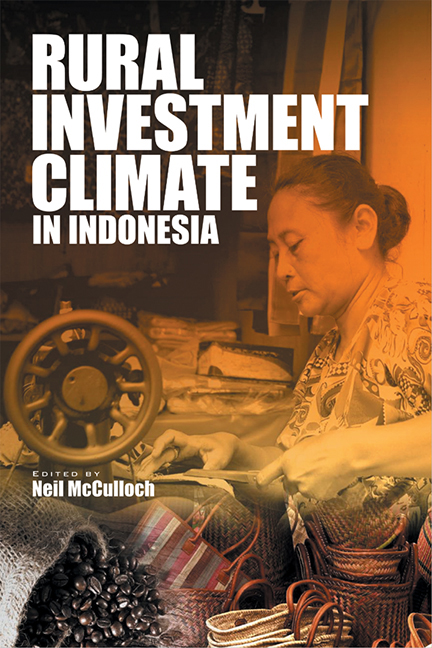Book contents
- Frontmatter
- Contents
- List of Tables, Figures, and Boxes
- Abbreviations and Acronyms
- The Contributors
- 1 Introduction
- 2 Agricultural Demand Linkages and Growth Multipliers in Rural Indonesia
- 3 Trends and Constraints Associated with Labour Faced by Non-Farm Enterprises
- 4 The Constraints in Accessing Credit Faced by Rural Non-Farm Enterprises
- 5 The Constraints Associated with Infrastructure Faced by Non-Farm Enterprises at the Kabupaten Level
- 6 Technology/Knowledge Transfer and Diffusion in Indonesian Non-Farm Enterprises
- 7 Marketing and Competition in the New Indonesia
- 8 Local Tax Effects on the Business Climate
- 9 Leadership and Voice in Local Governance
- 10 Insecurity and Business Development in Rural Indonesia
- Index
10 - Insecurity and Business Development in Rural Indonesia
Published online by Cambridge University Press: 21 October 2015
- Frontmatter
- Contents
- List of Tables, Figures, and Boxes
- Abbreviations and Acronyms
- The Contributors
- 1 Introduction
- 2 Agricultural Demand Linkages and Growth Multipliers in Rural Indonesia
- 3 Trends and Constraints Associated with Labour Faced by Non-Farm Enterprises
- 4 The Constraints in Accessing Credit Faced by Rural Non-Farm Enterprises
- 5 The Constraints Associated with Infrastructure Faced by Non-Farm Enterprises at the Kabupaten Level
- 6 Technology/Knowledge Transfer and Diffusion in Indonesian Non-Farm Enterprises
- 7 Marketing and Competition in the New Indonesia
- 8 Local Tax Effects on the Business Climate
- 9 Leadership and Voice in Local Governance
- 10 Insecurity and Business Development in Rural Indonesia
- Index
Summary
Introduction
Anecdotes abound about day-to-day insecurity in Indonesia, and the negative effects of this insecurity on businesses. John MacDougall (2003) writes, “contemporary Jakarta is home to hundreds of localized ethnic gangs”, but “organized crime ventures are not new to Jakarta”. In a highly-publicised case, the world's largest retailer, Wal-Mart, pulled out of Indonesia in 1998, in large part because one of its two stores was looted and torched. And a study of truck drivers plying the road between Medan and Banda Aceh found that as recently as early 2006 they were forced to pay bribes averaging Rp 687,000 (US$74) per round trip (BRR 2006).
Suggestive as they may be, it is not obvious that the anecdotes reflect widespread insecurity. So the first task of this chapter is to sift through the available evidence in order to answer a simple question: how widespread is insecurity in Indonesia, and specifically in rural Indonesia, which has traditionally been viewed as more peaceful and safer than the urban areas.
Evidence of widespread insecurity is not, per se, sufficient to make the case that business development has been stunted as a result. By international standards the murder and incarceration rates in the United States are high, but they have not prevented the United States from achieving affluence and sustained economic growth. Thus the second task of this chapter is to determine the extent to which violence, or the threat of violence, limits business development.
Based on the empirical findings, we are then in a position to discuss the nature of insecurity in Indonesia — who are the actors, what lies at the root of the violence insofar as it affects business, and who is (or should be) in a position to do something about it.
How Widespread is Insecurity in Indonesia?
Internationally-published statistics on crime rates show Indonesia to be an exceptionally safe country, as Table 10.1 illustrates. If they are to be believed, the numbers show that over the period 1998–2000, the murder rate in the United States (at 57 per million population) was almost six times as high as in Indonesia, and the rate of assaults was 72 times higher.
- Type
- Chapter
- Information
- Rural Investment Climate in Indonesia , pp. 300 - 330Publisher: ISEAS–Yusof Ishak InstitutePrint publication year: 2009



